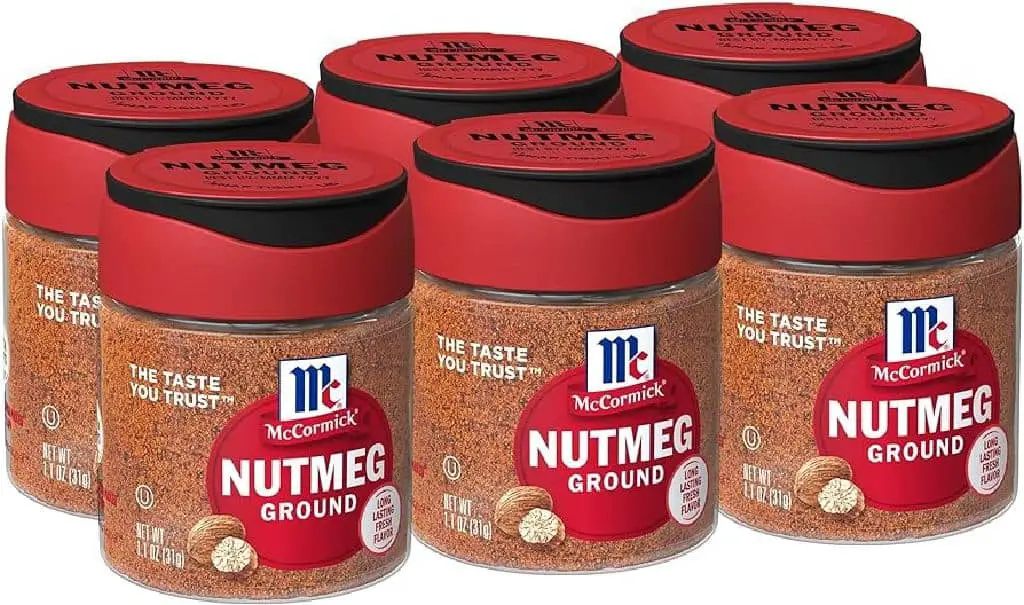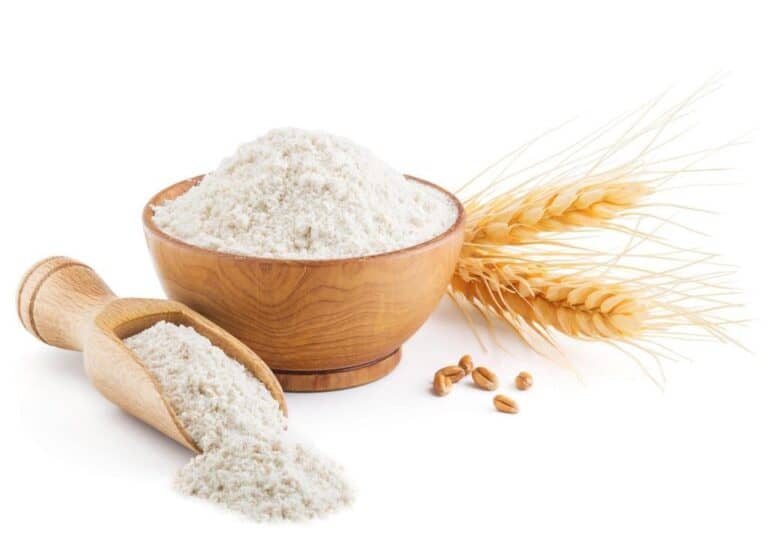What Happens if You Eat Expired Nutmeg? Find Out Now!

Have you ever thought about what might happen if you forget about that jar of nutmeg in the back of your spice cabinet for too long? The dark powder, which looks harmless and is a common ingredient in many kitchens, hides more than just a great smell and warm taste. Today, we will explore expired nutmeg, uncovering its secrets and risks.
As food lovers and home cooks, we often pay close attention to how fresh the products are. But spices like nutmeg are sometimes left out to rot without being used. As with any spice, eating spoiled nutmeg may affect taste and health unexpectedly.
It’s time to bring attention to what happens when we forget to check the tiny expiration dates on our favorite spice packages. This information could keep us from making unintended food mistakes.
Join me to discover new culinary territory. Learn about the risks and truths of consuming spoiled nutmeg. Let’s learn the most important things we need to know to safely and responsibly navigate this aromatic path.
What Happens if You Eat Expired Nutmeg?

Eating expired nutmeg can cause food poisoning If the nutmegs were stored incorrectly. Nutmeg that has been in regular contact with heat or water should be thrown away after its expiration date. This is especially true for ground or powdered nutmeg. If the nutmeg was correctly stored, It is safe for consumption.
Contaminated nutmeg may contain aflatoxins that are carcinogenic to humans. They may also contain mycotoxins released by pathogenic fungi. Mycotoxins irritate the respiratory system and prompt allergic reactions.
But old nutmeg won’t impart the same flavor to your recipe as its fresh counterpart. This article also includes the storage tips for nutmeg to prolong the shelf-life of this spice. Read on if you want to know how to identify bad or spoiled nutmeg powder and the health benefits of nutmeg.
Potential Health Concerns
Consuming expired nutmeg can lead to various potential health concerns that should not be taken lightly. One of the primary risks involves digestive issues such as nausea, vomiting, or diarrhea.
Nutmegs past their expiration date may lose flavor and essential oils. It could also harbor harmful bacteria, causing stomach upset.
Expired nutmeg may cause allergic reactions in some people, particularly those sensitive to certain compounds in the spice. Symptoms of an allergic reaction to outdated nutmeg may include itching, swelling, or respiratory problems.
Be aware of known allergies before using expired nutmeg to prevent health issues. Expired nutmeg not only loses taste and aroma but also poses health risks that can affect your well-being.
Hidden Dangers of Expired Nutmeg
Expired nutmeg may harbor hidden dangers that could pose risks to one’s health. Over time, as nutmeg reaches its expiration date and beyond, it becomes susceptible to the growth of harmful bacteria or mold.
These microorganisms can grow on the surface of old nutmeg, which could make you sick if you eat it without knowing it. If mold or bacteria are present, they not only change the smell and taste of the spice, but they can also be very bad for people who eat it.
Rancidity is another issue that plagues expired nutmeg. As this spice ages, its essential oils deteriorate, causing a shift in flavor profile and potency. Rancid nutmeg loses its warm, sweet taste and may develop off-putting flavors, making it unfit to eat.
Eating rancid nutmeg can ruin your dish and cause stomach issues. This happens because the spice breaks down fats.
Expired nutmeg’s quality decreases with time, affecting its culinary use. Nutmeg’s role in enhancing dishes with its unique flavor becomes compromised when the spice expires. Its ability to impart warmth and depth to recipes diminishes with age, resulting in lackluster culinary outcomes.
| Also see: Can You Eat Unopened Expired Sour Cream? |
Alternative Uses for Expired Nutmeg
Instead of consuming expired nutmeg and risking health issues, explore its alternative uses. These uses can still offer benefits in different ways.
Harnessing Aromatherapy Benefits
- Potpourri Mixes: Place a small amount of expired nutmeg in potpourri mixes or sachets to enjoy its warm and comforting scent lingering throughout your living space.
- Cozy Ambiance: The aromatic properties of nutmeg can help create a cozy ambiance, perfect for relaxation or enhancing mood.
DIY Household Cleaning
- Natural Antibacterial Properties: Expired nutmeg’s natural antibacterial properties make it a great ingredient for creating homemade cleaners.
- Chemical-Free Cleaner: Mix expired nutmeg with other safe household items like vinegar or baking soda to concoct an effective and chemical-free cleaner for various surfaces in your home.
Natural Insect Repellent
- Deter Insects: Utilize expired nutmeg’s strong scent to deter pesky insects from invading your home by strategically placing sachets containing the spice in areas prone to bug infestations.
- Chemical-Free Approach: This natural approach keeps unwanted critters at bay without harsh chemicals and gives purpose to expired spices that would otherwise go unused.
By creatively repurposing expired nutmeg, you avoid health risks. You also get to explore new benefits beyond cooking.
How to Store Nutmeg?
Nutmeg should be stored like any other spice in your kitchen. It should be protected from moisture, heat sources like direct sunlight, and the stovetop.
- A dark, cool, and dry place like the pantry or kitchen cabinet is the best storage place for nutmeg weather whole or grounded. Moisture promotes mold growth. Sunlight or heat will ruin spice flavor and potency.
- The storage container for whole or grounded nutmeg should be an air-tight container. A zip-lock bag can work too. Make sure you remove all the air from the bag before sealing it to create a vacuum.
- Nutmeg does not need to be refrigerated. In fact, the humid conditions of the refrigerator will ruin the flavor and reduce the shelf-life of the nutmeg.
- Ground or grated nutmeg is more prone to spoilage due to the increased surface area that is available for mold attack. If you want to keep your nutmeg for longer, buy the whole nutmeg.
- Last but not least, do not use wet or used spoons to measure your nutmeg powder. It will ruin the quality of the spice.
Can You Freeze Nutmeg?
Yes, you can freeze nutmeg, but It is not recommended to do so. As mentioned previously, the humid environment of the fridge or freezer is detrimental to the potency and safety of nutmeg.
Moreover, condensation in the storage container of the nutmeg when you frequently use it poses a big threat to the quality of nutmeg.
Storing nutmeg in the freezer won’t prolong its shelf-life. However, If you are determined to freeze the excess nutmeg, use a heavy duty resealable bag. Make sure to remove as much air from the bag as possible.
How Long Does Nutmeg Last?
| In the pantry | |
| Ground | 2-3 years |
| Whole | 4-5 years |
The whole nutmeg naturally lasts longer than its ground or powdered part. Moreover, nutmeg is expensive so It is recommended to buy it in smaller quantities so that you won’t have to worry about its storage. Exposure to sunlight, heat, or moisture will reduce the shelf-life of the nutmeg.
| Related: Can You Eat Unopened Expired Canned Food? |
How Do You Tell if Nutmeg Is Bad?
- If the nutmeg smells bad or you notice any type of organic growth, discord the nutmeg. This happens when the nutmeg has been in contact with moisture.
- If the nutmeg looks fine but has been sitting in storage for too long, It is best to check its potency before adding it to your recipes.
To check the potency of the nutmeg, grate the nutmeg If It is not powdered. Take some of the grated nutmeg between your finger and give It a sniff. If you can barely smell nutmeg on your fingers, It needs to be discarded because It has lost its potency.
| Check out: Do French Fried Onions Expire? |
Tips for Handling Expired Nutmeg Safely
Proper storage plays a vital role in maintaining the quality and potency of nutmeg. To extend its shelf life, store whole nutmeg in a cool, dark place away from heat and moisture. Ground nutmeg is more susceptible to degradation, so refrigerating it can help preserve its flavor. Storing nutmeg in an airtight container prevents air exposure. This helps slow down deterioration.
Checking expiration dates is crucial when dealing with spices like nutmeg. Even though whole nutmeg lasts longer than ground nutmeg, both varieties do have a limited shelf life. Conduct regular pantry checks to ensure you are using spices within their prime. If you find expired nutmeg or notice any signs of spoilage such as clumping or a dull color, it’s best to discard it promptly to avoid any risks.
Differentiating between fresh and spoiled nutmeg involves using your senses. Fresh nutmeg has a strong, aromatic fragrance with warm and slightly sweet notes. On the other hand, expired nutmeg might have a musty or off-putting odor, indicating that it’s past its prime.
Fresh nutmeg is deep reddish-brown. Older nutmeg looks faded or discolored. Trusting your sensory cues can help you determine whether your nutmeg is still safe for consumption or if it’s time to replace it with a fresh batch.
Is Nutmeg Poisonous?
Nutmeg contains a narcotic substance called myristicin, which can be toxic If consumed in large enough amounts.
Standard recipes use a safe amount of nutmeg. Consuming over 1 teaspoon of nutmeg at once can cause hallucinations, nausea, vomiting, dizziness, and an irregular heartbeat. Symptoms appear within 1-6 hours after ingestion.
However, nutmeg poisoning is quite rare. Pregnant women should refrain from consuming nutmeg in large amounts. To avoid the risk of miscarriage and birth defects.






